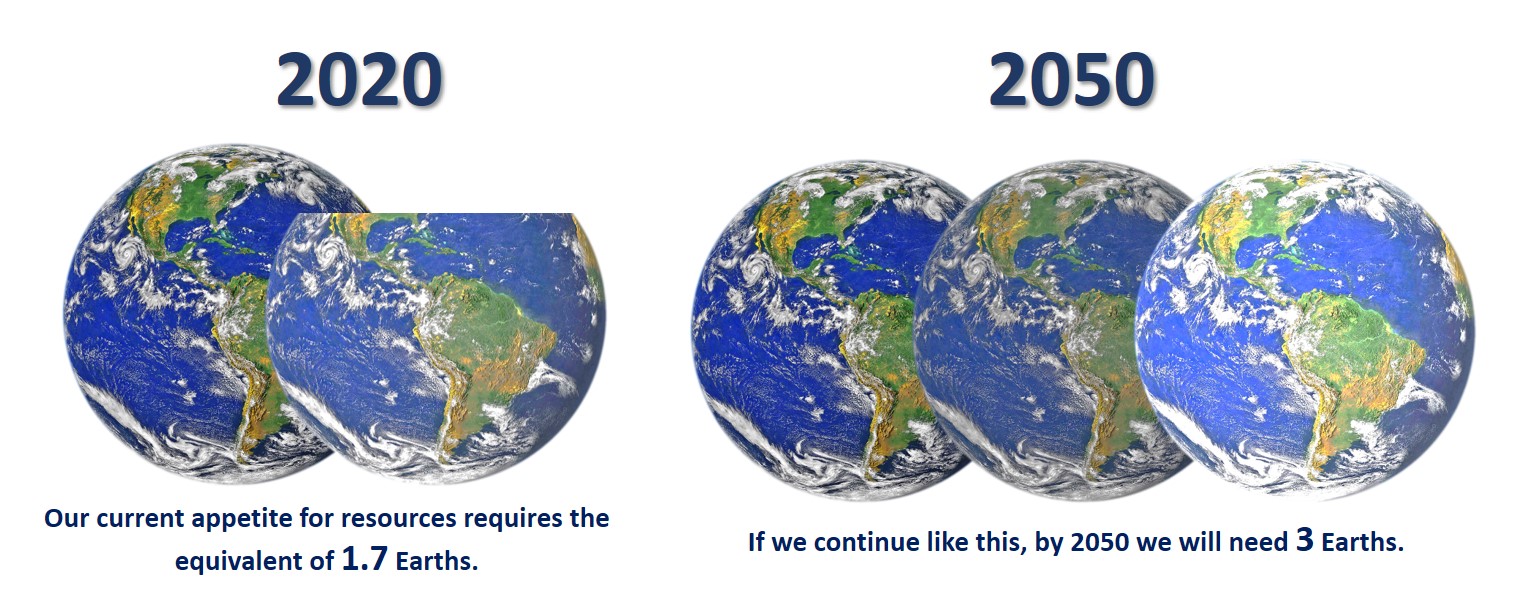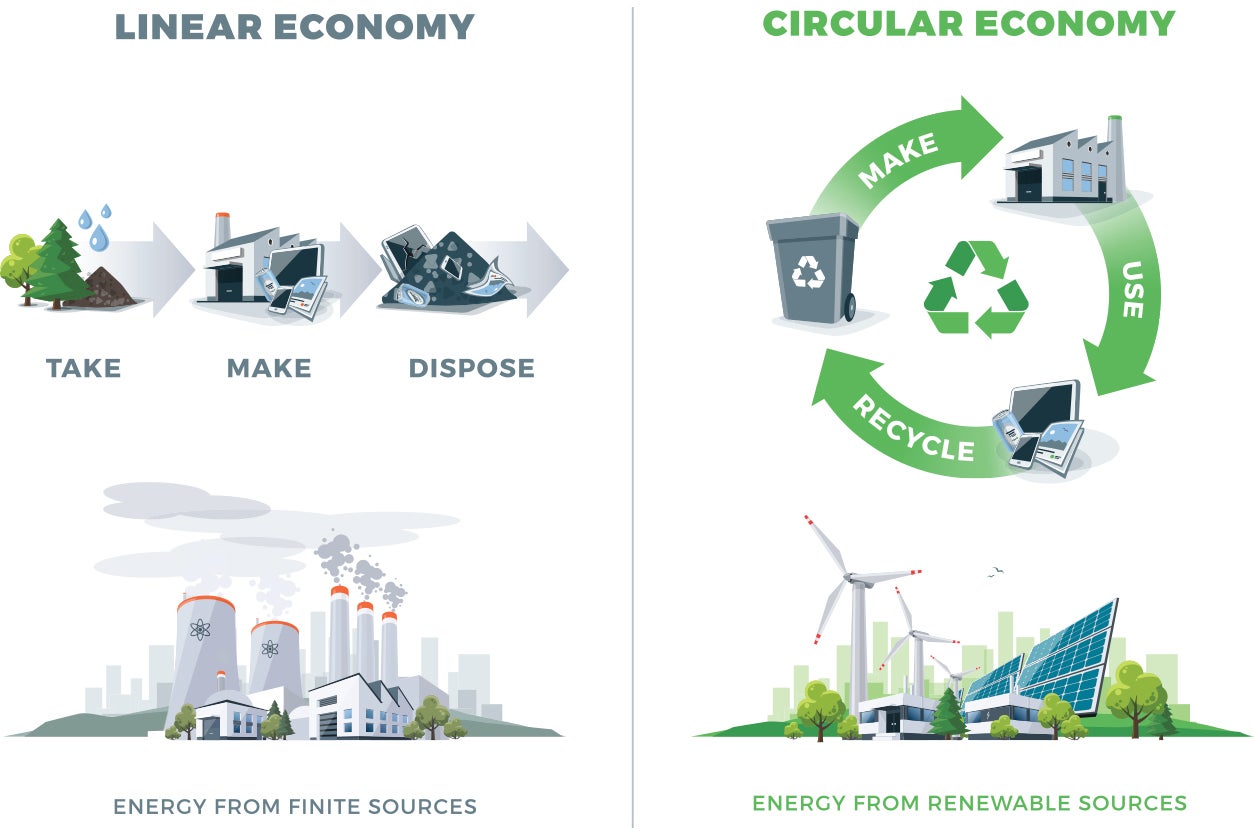If we continue to consume at the current rate, in a few years we will need resources equivalent to three planets to sustain us. How can we avoid this forecast?
The crisis we are facing with the COVID-19 pandemic has revealed the vulnerability of the current economic system. Our recovery requires a drastic change in our production and consumption patterns for a circular model in which all products are designed and produced considering the efficient use of natural resources, their reuse, recycling, and the minimization of waste. We have a unique opportunity to make a transition to a more sustainable model that is compatible both with economic and social development and with the planet, making the definitive leap to a resilient and circular economy.

Current resource management, a failed system
The level of overexploitation of natural resources, carbon emissions, and our current waste generation is too high for ecosystems to have the capacity to buffer the impact or compensate for changes. A recent World Bank report warns us that, should the forecast that the world population will reach 9.6 billion by 2050 be fulfilled, it would take about three planets to be able to maintain the current lifestyle.
The population growth in recent decades, mainly in large cities, has been accompanied by a significant increase in consumption, causing an exponential increase in the amount of waste produced.
The current situation in Latin America and the Caribbean is not encouraging. According to a recent report by UN Environment, the region generates roughly 10% of the world’s waste. Approximately one third ends up in open dumps with inadequate final disposal practices, which causes serious impacts on health and the environment. Additionally, it is estimated that only 10% of the waste generated is being recovered and that an enormous amount of material and energy resources are being wasted.
Therefore, the transition to a circular economy, in which the value of resources, materials and products is maintained for as long as possible, while minimizing waste generation, will be key. This transition will promote the development of a resource-efficient, sustainable economy that generates competitive and sustainable advantages. It will in turn avoid price volatility that results from resource scarcity and help create new and innovative opportunities. On the other hand, it could become a source of local jobs, providing clear opportunities for social cohesion and integration.
Sustainability of key sectors
Increasing the coherence of policies that promote environmental sustainability will be key to achieving the United Nations Sustainable Development Goals (SDGs) by 2030, particularly SGD 12 that refers to ensuring sustainable consumption and production patterns.
It will be essential to have regulatory frameworks in the region that stimulate the sustainability of key sectors, help prevent the generation of waste and promote its recovery in all strategic sectors of the economy. To do this, it will be necessary to establish lines of action that promote research and innovation programs in the creation of new materials, technologies that optimize their recovery, and production methods that promote our transition towards a circular economy.
We are backing the circular economy
The implementation of environmental and social policies in operations financed by the IDB offers clear benefits to promote measures aimed at preventing, reducing, reusing, and recovering waste, as well as at reducing or eliminating the contamination resulting from project activities, through materials free of toxic substances. Besides, if necessary, it allows strengthening national regulations and the institutional capacity of borrowers to comply with international standards and best available practices.
In this regard, the new IDB Environmental and Social Policy Framework sets ambitious standards in various areas and provides cutting-edge provisions to address environmental and social issues. Specifically, the Environmental and Social Performance Standard on Resource Efficiency and Pollution Prevention (Standard 3) recognizes the concept and emerging practice of the circular economy and resource recovery, according to which it is possible to create or obtain usable and valuable products from what was previously considered waste.
Time to take action
Latin America and the Caribbean face an urgent need to increase investment in a resource-efficient economy. Valuable materials are polluting and damaging our ecosystems instead of being reused. Therefore, a circular economy approach that abandons the traditional idea of a linear economy (extract-produce-discard) and that puts the emphasis on reusing materials and products will be the best solution to the waste generation problem.
We face an unprecedented global challenge. Planning the economic recovery after COVID-19 will be a unique opportunity to align ourselves with the 2030 Agenda for Sustainable Development, transforming our society and the economic model to ensure a promising future for all.
In several countries, measures are being implemented to recover materials present in the waste. Do you think it is a feasible and economically sustainable system that could be implemented in the short term? What can governments do to boost reuse and the circular economy?
This blog post is part of a series about the IDB‘s new Environmental and Social Policy Framework (ESPF). You may also want to read:
Three things you need to know about the IDB’s new Environmental and Social Policy Framework


Very well written. Truly the Circular economy is the most sustainable way going forward in modern times. Not only reuse but recover will be the motto in the future. Resources are scarce and as citizens and nations we have to consider this considering the climate change, industrialisation and population explosion and so many factors which would be detrimental to human, animal and plant life..Encouragement of circular economy businesses and the ecosystem development would be a great step forward for Global leaders and Decision Makers. I am a proponent of this concept and have been working in the Circular Sanitation Economy and the space since the last many years innovating and working on sustainable business models with toilets and waste resources in India and abroad along with organisations like The Toilet Board Coalition and PSA India.
“Uma Europa que utilize eficazmente os recursos” é uma das 7 iniciativas emblemáticas que fazem parte da Estratégia 2020 que pretende gerar um crescimento inteligente, sustentável e integrador.Actualmente é a principal estratégia da Europa para gerar crescimento e emprego, com o apoio do Parlamento Europeu e o Conselho Europeu.
Esta iniciativa emblemática pretende criar um quadro político destinado a apoiar a mudança para uma economia eficiente no uso dos recursos e de baixa emissão de carbono e que nos ajuda a:
– melhorar os resultados económicos ao mesmo tempo que se reduz o uso dos recursos;
– identificar e criar novas oportunidades de crescimento económico e impulsionar a inovação e a competitividade da UE;
– garantir a segurança do fornecimento dos recursos essenciais;
– lutar contra a mudança climática e limitar os impactos meioambientais do uso dos recursos.
Esta iniciativa emblemática oferece um quadro de medidas a longo prazo e, de maneira coerente, outras a médio prazo entre as quais já está identificada uma estratégia destinada a converter a UE numa “economia circular” baseada numa sociedade de reciclagem a fim de reduzir a produção de resíduos e utilizá-los como recursos.
A economia circular é um conceito económico que se interelaciona com a sustentabilidade, e cujo objectivo é que o valor dos produtos, os materiais e os recursos (água, energia,…m se mantenha na economia durante o maior tempo possível, e que se reduza ao mínimo a geração de resíduos. Trata-se de implementar uma nova economia, circular, não linear – baseada no princípio de “fecho de ciclo de vida dos productos, os serviços, os resíduos, os materiais, a água e energia.
A economia circular é a intercepção dos aspectos ambientais e económicos. A economia circular é geradora de empregos. O serviço de geração de resíduos em Espanha representa milhares de postos de trabalho.
Num contexto de escassez e flutuação de custos dematérias-primas, a economia circular contribui para a segurança do fornecimento e para a redindustrialização do territóro nacional. Os resíduos de uns convertem-se em recursos para outros. O producto deve ser desenhado para ser desconstruído. A economia circular consegue converter nossos resíduos em matérias-primas, paradigma de um sistema futuro. Finalmente, este sistema é um sistema gerador de emprego local e não deslocalizável.
Nota: termino por aqui,,mas podia escrever mais coisas, sobre ‘Funcionamento da economia circular’, muchas gracias caro amigo Alvaro Adam.
Really nice blog. As you are writing “We face an unprecedented global challenge. Planning the economic recovery after COVID-19 will be a unique opportunity to align ourselves with the 2030 Agenda for Sustainable Development, transforming our society and the economic model to ensure a promising future for all”, I am just wondering how can we transition smoothly into circular economy while maintaining a healthy economic growth and prosperity for developing countries? Given that the Post-covid19 economic situation is even gloomier and harder in general.